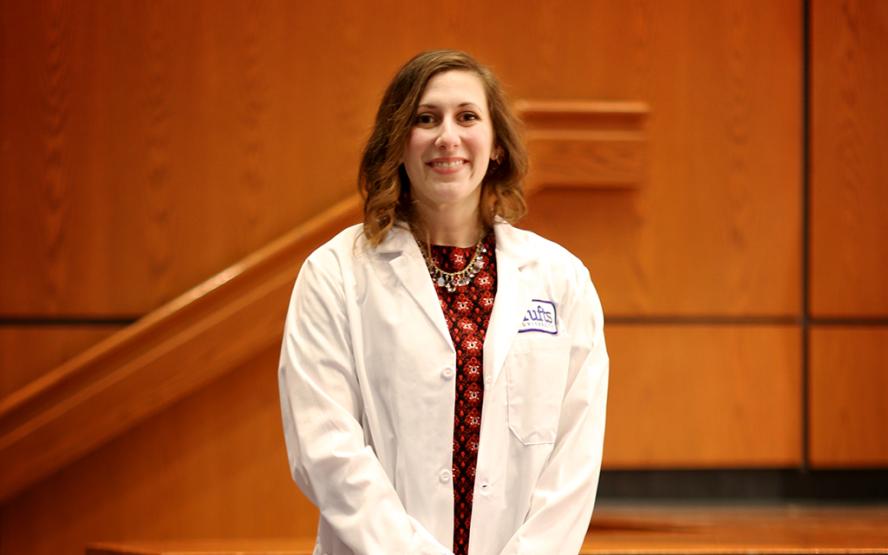-
About
- Leadership & Faculty
- News & Events
-
Admissions
-
Academics
- Graduate
- Advanced Clinical Training
- Continuing Education
-
Student Life
-
-
Accommodations
- Our Campus
-
Accommodations
- Graduate Resources
-
-
Research
-
Hospitals & Clinics
- Emergency Care
- Hospital Services
-
Community Outreach
- Volunteer
This Graduate Has a Passion for Cancer Research
Alexandra Christodoulou, V20, will use her degree to fight cancer in animals and humans

Alexandra Christodoulou, V20, developed an interest in veterinary school when she was an undergraduate at Northeastern University in Boston. Northeastern offers students the opportunity to participate in co-op work experiences, and hers involved oncology research at pharmaceutical companies.
“I worked on a lot of animal studies involving mice and realized I loved working with research animals,” she said. “These experiences led me to veterinary school because I wanted to have a greater impact on research animal welfare as a lab animal veterinarian.”
A New York native, Christodoulou spent her higher education career in Massachusetts. After earning a B.S. in biochemistry and a Master’s in biotechnology at Northeastern, she worked in animal research for a few years.
Soon after, she enrolled in the D.V.M. program at Cummings School of Veterinary Medicine.
At Cummings School, Christodoulou acted as a liaison between faculty and students, representing the Class of 2020 on the Veterinary Education Resource Committee. She gathered feedback and comments from students about their classes and, when necessary, worked with faculty to implement changes to address their concerns.
For example, she recalled a class with an exam that tested across more than 40 hours of lecture material. Although veterinary students expect challenging coursework, Christodoulou explained that students found it difficult to prepare for this exam, which made up a large portion of their grade.
She worked with the professor to shift the exam schedule from three exams per semester to four and divide the material more evenly among them, which helped her fellow students prepare for tests with more confidence.
“A lot of issues would come up around other courses’ exams, too,” she said. “The faculty were always great to work with and tried to come up with a solution.”
Christodoulou also was part of the student chapter of the American Society of Laboratory Animal Practitioners (ASLAP), which raises awareness of laboratory animal science among veterinary students.
She said the most challenging part of the four-year program was the coursework and the tough curriculum, and she cited her parents and her boyfriend as being especially supportive during this time.
But the most rewarding part of the program was meeting a diverse group of classmates.
“To be able to work with people who are interested in large animals and people who are interested in public health, to meet all those different perspectives, you really see how diverse a veterinary degree can be,” she said.
Christodoulou is passionate about oncology research and comparative oncology, which she explored first as a lead technician at Dana-Farber Cancer Institute and then at Cummings School.
Before veterinary school, she worked at Dana-Farber, creating patient-derived xenograft models in mice, where they took human patient tumor samples and implanted them into mice. The goal of the project is to create a repository of research samples for hundreds of cancer types, which are accessible to researchers worldwide looking to better understand cancer biology and to develop effective new therapies.
At Cummings School, she learned about oncology clinical trials that pet owners can choose to enroll their pets in. “I was able to shadow the technicians in the Clinical Trials Office,” she said. “It was a unique experience to see industry- and research-grant-sponsored clinical trials, and it was great exposure to potential future options for veterinary oncology patients.”
“There are numerous hurdles in transitioning from laboratory animal models to human patients, which is a reason why it is difficult to find successful treatments,” Christodoulou said. “I think comparative oncology studies can provide more information about how a drug candidate will behave in a human patient with a similar disease. These trials provide a lot of information for human medicine but can also directly benefit the veterinary patients involved.”
Now, Christodoulou is in the process of moving across the country to Seattle, where she’ll spend the next three years at the University of Washington working in laboratory animal science.
“I hope to promote comparative trials in veterinary patients as another means for researchers to learn more before proceeding with clinical trials in humans,” she said. “I also hope to work on refining laboratory animal models so they can provide us with more accurate information.”
Department:
DVM Program